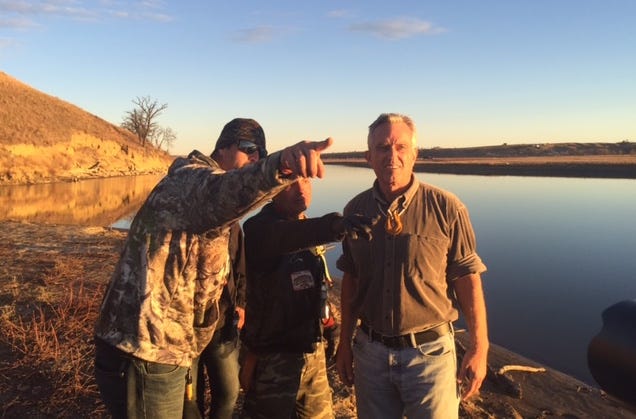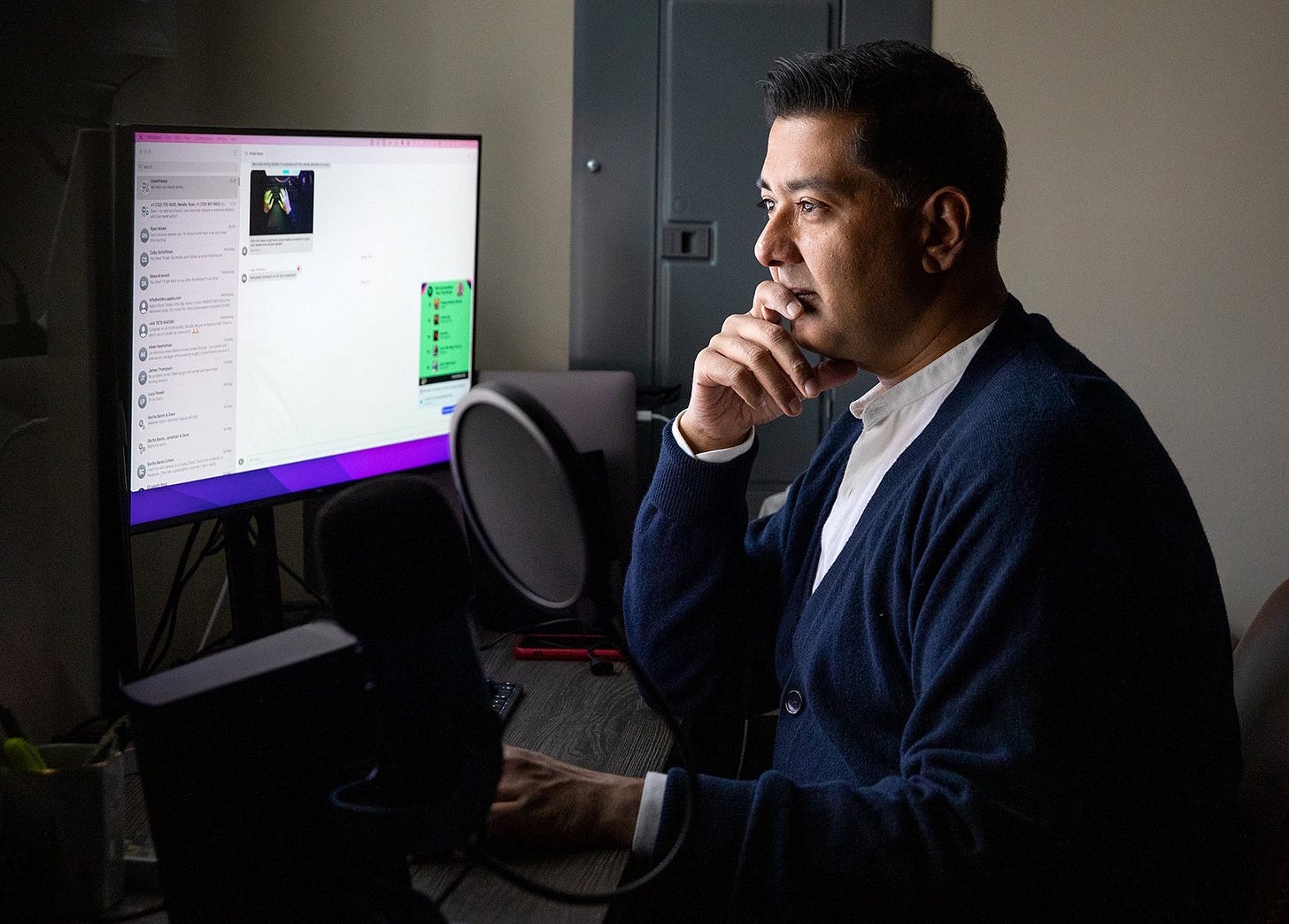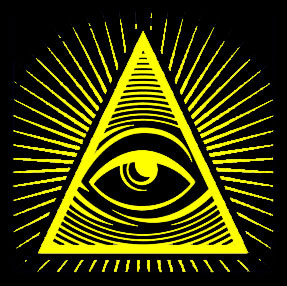Robert F. Kennedy Jr. took the stage in Washington D.C. on Jan. 23 to protest vaccine mandates and warn Americans about what he called “turn-key totalitarianism” – the possibility that modern technology will empower total control of populations in ways only dreamed of by past dictators like Benito Mussolini and Adolf Hitler.
“Even in Hitler’s Germany, you could cross the Alps into Switzerland. You could hide in an attic like Anne Frank did,” Kennedy told the Defeat the Mandates crowd on the steps of the Lincoln Memorial, in a warbling voice caused by a condition called spasmodic dysphonia. “Today, the mechanisms are being put in place that will make it so none of us can run, none of us can hide.”
Condemnation was swift and universal, just like last year’s news that Instagram had banned Kennedy. The U.S. Holocaust Memorial Museum tweeted, “Making reckless comparisons to the Holocaust, the murder of six million Jews, for a political agenda is outrageous and deeply offensive.”
The Auschwitz Memorial in Poland jumped into the melee, characterizing Kennedy's remarks as “exploiting” the tragedy of Nazi Germany. It declared: “A debate about vaccines and limitations during global pandemic is a sad symptom of moral and intellectual decay.”
Even Kennedy’s wife, “Curb Your Enthusiasm” actress Cheryl Hines, called his remarks “reprehensible and insensitive” on Twitter.
Kennedy apologized, but not before CNN took him to task in a Jan. 24 editorial by its National Security Analyst Peter Bergen, who wrote: “One of Kennedy's majors may have been history at Harvard, but it seems to have had little effect on his actual understanding of the subject.”
Bergen, a professor, journalist and author best known for his writings on Osama bin Laden, buttressed his smug swipe at Kennedy with two sources – which he seems to accept as gospel truth: the Center for Disease Control and Prevention (CDC), and the relatively obscure Center for Countering Digital Hate.
He concluded his pro-vaccination screed by musing, in essence, that only stupid people would question government policies like vaccine mandates. He admits he can’t imagine Kennedy being so stupid: “All of his education and professional success makes his crusade against vaccines even more puzzling.”
At least Bergen confessed he doesn’t understand Kennedy – but he didn’t mention trying to contact the man for comment. If he’d contacted me for advice, I’d have directed him to a 2020 profile of Kennedy published by Town and Country magazine. Author Ryan D’Agostino wove a sympathetic tale of a man dedicated to nature and freedom from corporate domination – with an understandable distrust of government intelligence agencies.
Not an angel, but definitely not a demon.
The Real Bobby, Jr.
The third-born of Robert Kennedy’s 11 children, Bobby Jr. is undeniably a black sheep. Wikipedia describes him as an “environmental lawyer, author, conspiracy theorist and anti-vaccine advocate.” His iconic father’s violent death pushed him towards drug abuse at age 15. By the time he was 30 – working as an assistant district attorney in Manhattan – he was pleading guilty to heroin possession and admitting himself to a New Jersey drug treatment center.
His experiences in recovery and community service led him to the position of chief prosecuting attorney for the Riverkeeper Association, suing Mobil Oil and other corporate polluters of the Hudson River.

From 1986 to 2017, Kennedy was a senior attorney for the Natural Resources Defense Council. Fighting against mercury pollution eventually led to a road questioning the vaccine industry. In 2005, Rolling Stone published a Kennedy piece about a government cover-up of possible links between childhood vaccinations containing a mercury-based preservative called thimerosal and the rise of autism.
“As an attorney and environmentalist who has spent years working on issues of mercury toxicity, I frequently met mothers of autistic children who were absolutely convinced that their kids had been injured by vaccines,” he wrote in the article, “Deadly Immunity.” “Privately, I was skeptical. I doubted that autism could be blamed on a single source, and I certainly understood the government's need to reassure parents that vaccinations are safe; the eradication of deadly childhood diseases depends on it.”
Kennedy wrote it was only after reading the transcripts of a secret meeting convened by the CDC at Simpsonwood Conference Center in 2000, studying the leading scientific research and interviewing authorities on mercury that he became convinced of a link between thimerosal and an “epidemic of childhood neurological disorders.”
Thimerosal – also known by the Eli Lilly trade name Merthiolate – was taken out of childhood vaccines in the U.S. in 2001, according to the CDC. Even though “research does not show any link between thimerosal in vaccines and autism,” the decision was called a “precautionary measure to decrease overall exposure to mercury among young infants.”
In 2015, Kennedy assumed leadership of the World Mercury Project, rebranded it Children’s Health Defense and became a rock star in the burgeoning anti-vaccine movement.
His family has been supportive on just about everything except his stance on vaccination. After the 2019 measles outbreak – six months before the novel coronavirus was identified – his brother and sister penned a critique of Bobby Jr.’s anti-vaccination advocacy.
“We love Bobby,” wrote Kathleen Kennedy Townsend (former chair of the Global Virus Network), Joseph Kennedy II (chairman and president of Citizens Energy Corporation) and Bobby’s niece, Maeve Kennedy McKean (formerly executive director of Georgetown University’s Global Health Initiatives, now deceased). “We stand behind him in his ongoing fight to protect our environment. However, on vaccines he is wrong.”
Most family members thought he was wrong about Sirhan Sirhan’s parole hearing last August. Joseph, Courtney, Kerry, Christopher, Maxwell and Rory Kennedy were “devastated” by the positive parole recommendation for RFK’s convicted assassin.
“Our father’s death impacted us in our family in ways that can never adequately be articulated,” they wrote. “Sirhan Sirhan committed a crime against our nation and its people. He took our father from our family and he took him from America. We are in disbelief that this man would be recommended for release.”
Bobby Jr. asked the question, What would RFK do?
“While nobody can speak definitively on behalf of my father,” he stated in support of Sirhan’s release, “I firmly believe that based on his own consuming commitment to fairness and justice, that he would strongly encourage this board to release Mr. Sirhan because of Sirhan’s impressive record of rehabilitation.”
Sirhan’s release was overturned by California Gov. Gavin Newsom on Jan. 13. Bobby Jr. believes there was a second gunman – Thane Eugene Cesar – a rent-a-cop hired at the Ambassador Hotel that fateful summer.
Digital haters
Despite the profile of a man who sticks up for the black sheep, Bobby Jr. is “imperiling the lives of many Americans,” according to Bergen and has been named to the “Disinformation Dozen” by the Center for Countering Digital Hate (CCDH).
In a survey of some 800,000 Facebook and Twitter posts, the CCDH figured 65 percent of anti-vaccine content is attributable to 12 anti-vaccine activists, alternative health entrepreneurs and physicians.
Bobby Jr. is second on a list that includes osteopathic physicians Joseph Mercola and Sherri Tenpenny, and alternative-health entrepreneurs Ty and Charlene Bollinger. The CCDH envisions an “Anti-Vaxx Industry” with some 58 million customers to which hucksters can peddle conspiracy theories and false cures – enabled by a social media industry poised to make millions in ad revenues.
There is very little public information on the CCDH, which was founded in 2019 by British political consultant Imran Ahmed. To fulfill its stated mission – “disrupt the architecture of online hate and misinformation” – Ahmed has engaged in several pro-censorship campaigns targeting right-wing commentators, neo-Nazis, climate change deniers and anti-vaccine advocates.

The CCDH has lobbied companies like Google, Facebook and Twitter to remove a variety of British commentators and politicians from their social media platforms.
“Social media companies can start by enforcing their own policies on Covid-related and health misinformation,” Ahmed writes. “Fundamentally, someone can’t believe propaganda they’ve never been exposed to.”
Most recent, the CCDH launched a campaign to get Substack to drop newsletters by Mercola and former New York Times reporter Alex Berenson. Ahmed estimates that Substack generates at least $2.2 million a year from five popular anti-vaccine newsletters, 10 percent of which goes to company coffers.
In all of Ahmed’s discussion of monetization, he hasn’t yet mentioned what could be called the “Vaxx Industry” – OxFam estimates that Pfizer, BioNTech and Moderna made pre-tax profits of $34 billion in 2021.
Substack answered back with an article entitled, “Society has a trust problem. More censorship will only make it worse.” Company co-founders Hamish McKenzie, Chris Best and Jairaj Sethi wrote: “We allow writers to publish what they want and readers to decide for themselves what to read, even when that content is wrong or offensive, and even when it means putting up with the presence of writers with whom we strongly disagree.”
I’d venture a guess that Bobby Jr. would agree with Substack. As he told Town and Country: “I grew up in a milieu where we argued every night at the dinner table. We were encouraged to argue and to maintain friendships with each other.”
What would RFK do?
How do journalists find credible firsthand sources leading to a corroborated sense of truth? Join us for an upcoming “Truthsmack Tuesday” – click here for class topics.





